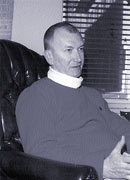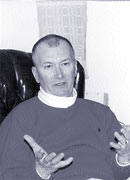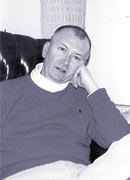 |
 |
|||||
 |
 |
 |
 |
 |
||||||||||
 |
 |
 |
||||||||
| Father William Zavaski: “If there’s one poverty we have living out here in the Northwest suburbs, it’s the lack of color.” Catholic New World photos/Sandy Bertog Sunday brings ‘Dwell in My Love’ to parishes
Father William Zavaski, pastor of St. James Parish in Arlington Heights, was one of the priests who suggested that the archdiocese schedule a special Sunday to reflect on “Dwell in My Love,” Cardinal George’s pastoral letter on racism. The idea was to bring the attention of all Catholics to the sin of racism, he said. “Dwell in My Love” Sunday has been scheduled for Jan. 13, the Feast of the Baptism of Our Lord. Zavaski discussed why he, as pastor of a large, nearly all white parish, sees a need to focus on racism. The Catholic New World: How did the idea for “Dwell in My Love Sunday” come about? Father William Zavaski: You want to know how it really started? It was a Thursday afternoon in Michigan City, Ind., and several of my classmates and I were gathered together on our day off. Four of us are deans, and we had just received the pastoral letter, and we were reading it and discussing its impact on the archdiocese. Three of us—Father Bob Heidenreich from St. Benedict (Irving Park) and Father Frank Kane from St. Joseph in Wilmette and I—we thought it was a great document, and we thought it was great to start with the press conference—but how could it make an impact in all of our parishes? We came at it from different angles, but the three of us thought wouldn’t it be great if throughout the archdiocese we would have a “Dwell in My Love Sunday” where we could talk about the sin of racism and the challenge of dealing with prejudice? We all three agreed this would be a great thing to do. We called Bishop Goedert’s office and told him we had this idea to bring up at the vicars and deans meeting last August. TCNW: Why do you think we need a Dwell in My Love Sunday? FWZ: The impact of having all the parishes throughout the archdiocese speak on this topic on one Sunday makes an important statement. I think it’s important for people, as we gather together as community to focus on the whole idea of the body of Christ, that we then would be able to talk about this whole idea of racism and prejudice. It is a major issue for everybody. I think it was a great pastoral letter, and this is one way we can help our people get to it, by talking about it on Sunday. So we’re doing it on the Baptism of the Lord, and it fits in with the whole idea that we are all the beloved sons and daughters of God. It’s a natural. The issue for us is that we’ve got a lot of people who are so busy. They’ve got family lives, but many of them take their Sunday Mass obligation very seriously. This makes sense that we at least address this issue and speak about it when we have the community gathered. TCNW: What will you do here at St. James? FWZ: I will speak at all the Masses here on “Dwell in My Love” and also about another project we have going on here at St. James. I’m inviting people to come together in small faith groups, and also to talk about the impact of racism and prejudice and how, as disciples of Christ, if we really are going to be formed, we are going to have to deal with this issue—acknowledge it, admit it and work from there. If we say we really all are the beloved sons and daughters of God, we have to admit that. I think we all have to deal with racism and prejudice because these are really critical things and they affect us. We’re all prejudiced. We’ve got to admit that, and move from there. Christ is the ideal. That’s what we live for, that’s what we work toward, that’s what we look at. TCNW: How was the letter received in your parish? FWZ: We’ve got 4,700 families here, about 15,000 people. There are a number of people in our parish community who are very concerned about social justice. For those people, this was an important statement. We also have a lot of people in our parish community who are wrapped up in their family lives and for them, yeah, this was a nice thing. It was received at different levels. I think that living out in the suburbs, there’s a challenge. Most people will say they don’t have to deal with racism or prejudice. If there’s one poverty we have living out here in the Northwest suburbs, it’s the lack of color, and that is a poverty in this community. We’re all the same color, and our kids are not getting a good experience of what the world is like here, because they’re kind of insulated. That’s why we value the sharing (parish) program. My first parish in Waukegan, we had a wonderful mixture of several different ethnic groups. Then I moved to Wauconda. We had two major ethnic groups there, and actually, when I left, they had three ethnic groups. But coming out here, we really need to help our people become more aware of the world. Our kids don’t have that experience, and I feel bad for them. That’s part of the value of the whole sharing experience, so I’m really trying to up our involvement in the sharing experience. Our people are very generous when it comes to giving to the needy. Our people are very concerned about the poor, but we need to have more hands-on experience with them. TCNW: Do you think some of your people are afraid of people of color? FWZ: I grew up in a very ethnic neighborhood, and my family was afraid. They lived with a great deal of fear of anybody of a different color. I first began to try to overcome that fear when I was in seminary at Mundelein. I worked at Precious Blood on the corner of Congress and Western. It was the first time I lived in and experienced a neighborhood of color, and it was a great experience for me. I felt that I really grew. But my family still could not understand why I would want to live there for the summer. They were petrified. But I think we just live with those fears. We have to acknowledge them and try to overcome them.
Front Page | Digest | Cardinal | Interview |
||||||||||